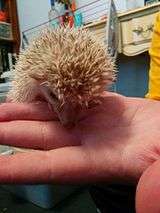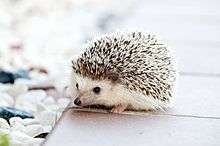Domesticated hedgehog
The most common species of domesticated hedgehog is the four-toed hedgehog (Atelerix albiventris). The Algerian hedgehog (Atelerix algirus) is a separate species of hedgehog.
The domesticated hedgehog kept as a pet is typically the African pygmy hedgehog (Atelerix albiventris).[1] Other species kept as pets include the Egyptian long-eared hedgehog (Hemiechinus auritus auritus)[2] and the Indian long-eared hedgehog (Hemiechinus collaris).[3]
Roman domesticated hedgehog
The Romans domesticated a relative of the Algerian hedgehog in the 4th century BC to use for meat and quills as well as pets.[4] The Romans also used hedgehog skins to clean their shawls, making them important to commerce and causing the Roman senate to regulate the trading of hedgehog skins.[5] The quills were used in the training of other animals, such as keeping a calf from suckling after it had been weaned.[6]
Hedgehog quills were used for card paper and dissection pins long after the Romans actively bred and raised hedgehogs.
Modern domestication

Hedgehog domestication became popular in the early 1980s although some U.S. some states ban them or require a license to own one.[7]
Since domestication began, several new colors of hedgehogs have been created or become common, including albino and pinto hedgehogs. Pinto is a color pattern, rather than a color: a total lack of color on the quills and skin beneath in distinct patches. Domesticated species prefer a warm climate (above 22 °C, 72 °F) and do not naturally hibernate. Attempts to hibernate due to lowered body temperatures can be fatal, but are easily reversed if caught within a few days.
Legality
Because a hedgehog is commonly kept in a cage or similar enclosure, it is allowed in some residences where cats and dogs are not allowed.
It is illegal to own a hedgehog as a pet in some jurisdictions in North America, and a license is needed to legally breed them. These restrictions may have been enacted due to the ability of some hedgehog species to carry foot and mouth disease, a highly contagious disease of cloven-hooved animals. No such restrictions exist in most European countries (although Italy is an exception).
The European hedgehog is a protected species in all countries that have signed the Berne Convention; this includes all member states of the Council of Europe, as well as the European Union and a small number of other states. In these countries, the European hedgehog may not be captured or kept as a pet.
Legal status internationally
- Austria: European hedgehogs are protected and cannot be kept as pets. Four-toed hedgehogs (African Pygmy hedgehogs) may legally be kept as pets.
- Australia: All hedgehogs are classified as exotic pets that are illegal to import.[8]
- Canada:
- Denmark: European hedgehogs are protected and cannot be kept as pets. Four-toed hedgehogs may legally be kept as pets.
- Finland: European hedgehogs are protected and cannot be kept as pets. Four-toed hedgehogs may legally be kept as pets.
- Germany: European hedgehogs are protected and cannot be kept as pets. Four-toed hedgehogs may legally be kept as pets.
- Italy: European hedgehogs are protected and cannot be kept as pets. Four-toed hedgehogs may legally be kept as pets.
- Latvia: European hedgehogs are protected and cannot be kept as pets. Four-toed hedgehogs may legally be kept as pets.
- Netherlands: European hedgehogs are protected and cannot be kept as pets. Four-toed hedgehogs may legally be kept as pets.
- Poland: European hedgehogs are protected and cannot be kept as pets. Four-toed hedgehogs may legally be kept as pets.
- Spain: European hedgehogs are protected and cannot be kept as pets. Four-toed hedgehogs are illegal and considered an exotic invasive species.
- Sweden: European hedgehogs are protected and cannot be kept as pets. Four-toed hedgehogs may legally be kept as pets.
- United Kingdom: European hedgehogs are protected and cannot be kept as pets. Four-toed hedgehogs may legally be kept as pets.
- United States:
- In Idaho and Oregon, European hedgehogs cannot be kept as pets. Four-toed hedgehogs may legally be kept as pets.
- In New Jersey and Wyoming, a permit is required.
- In Wisconsin, an import permit from the state department of agriculture is required to bring a hedgehog into the state.
- In Fairfax County, Virginia, it became legal to keep hedgehogs as pets in 2019.[9]
- In Pennsylvania, hedgehogs may not be imported into the state, but hedgehogs in the state as of 1992 and their descendants are allowed.[10]
- It is currently illegal to own a hedgehog in California,[11] Georgia, Hawaii, New York City,[12] and Washington, D.C.
- Singapore: Hedgehogs of all kinds are illegal, along with other exotic pets such as iguanas, tarantulas, scorpions, and snakes.[13]
- Turkey: European hedgehogs are protected and cannot be kept as pets, and four-toed hedgehogs may also not legally be kept as pets.
Enclosures

In the wild, a hedgehog will cover many miles each night.[14] A hedgehog with insufficient range may show signs of depression, such as excessive sleeping, refusal to eat, repetitious behaviour, and self-mutilation. Hedgehogs require a fair amount of exercise to avoid liver problems due to excess weight. Therefore, a domesticated hedgehog must have access to a running wheel. Running wheels must be selected carefully to avoid foot injury.[15]
Food
In the wild, a hedgehog is opportunistic and will eat many things, but the majority of the diet comprises insects. As insectivores, hedgehogs need a diet that is high in protein and low in fat. They also require chitin, which comes from the exoskeleton of insects; fiber in the diet may be a substitute for the chitin component. There are prepared foods specifically for pet hedgehogs and insectivores, including foods made from insect components. Also available are alimentary powders to sprinkle on other food which provide chitin and other nutrients.
Pet hedgehogs may eat such table foods as cooked, lean chicken, turkey, beef or pork. They will often eat small amounts of vegetables and fruit. Hedgehogs are lactose-intolerant and will have stomach problems after consuming most dairy products, though occasional plain low-fat yogurt or cottage cheese seem to be well tolerated.[16]
Hedgehogs can easily become obese; if they can no longer roll completely into a ball it is a clear sign of obesity. Conversely, hedgehogs often stop eating under situations of stress such as when adjusting to a new home.
Allergies
Hedgehogs produce very little danger to their owners and handlers.[17] It is possible to be allergic to items surrounding the hedgehog, such as the hedgehog's food or bedding, but it is rare that a person would be allergic to the hedgehog itself.
After handling hedgehogs, some have claimed that pink dots on their hands is an allergic reaction.[18] This is more likely caused by small pricks from the hedgehog's spines. If a hedgehog is not clean, the pricks can become infected. The infection is from contaminants on the hedgehog or on the surface of the hands, not from an allergic reaction to the hedgehog. As is true with most animal handling, one should wash their hands after handling a hedgehog.
Hedgehogs are commonly allergic to wood oils. Wood bedding should be avoided, specifically cedar. The oil found in cedar can cause severe upper respiratory problems. Aspen however is widely accepted as a safe substitute.
Diseases
Hedgehogs are prone to many diseases, including cancer, which spreads quickly in hedgehogs, and wobbly hedgehog syndrome (WHS), a neurological syndrome. Some symptoms of WHS resemble those of multiple sclerosis (MS) in humans, therefore the condition the animal experiences can be compared with what MS patients experience. A possible cause of WHS is a genetic flaw allowing a virus to attack the hedgehog's nervous system. The nose can display a variety of symptoms of a troubled hedgehog, especially respiratory illnesses such as pneumonia. In many cases, the form of pneumonia that affects hedgehogs is bacterial in nature. If acted upon quickly, antibiotics can have a very positive effect. Signs to watch for include bubbles, excessive dripping, or constant sneezing.
Hedgehogs usually react to stress with temporary digestive disorders that include vomiting and green feces.[19]
References
- http://hedgehogsofasgard.com/post/132357438526/the-african-pygmy-hedgehog-hybrid-or-not
- "An Array of Hedgehogs". The Times. 2014-06-10. ISSN 0140-0460. Retrieved 2018-08-22.
- "Basic Hedgehog Care". Exotic Nutrition. Retrieved 2018-08-22.
- Records, Guinness World (2014-09-16). Guinness World Records 2015. Guinness World Records. ISBN 9781908843821.
- Brehm, Alfred Edmund (1895). The Animals of the World: Brehm's Life of Animals, a Complete Natural History for Popular Home Instruction and for the Use of Schools. A.N. Marquis & Company. p. 294.
hedgehog romans.
- Wood, John George (1898). Animate Creation: Popular Edition of "Our Living World," a Natural History. S. Hess. p. 356.
romans hedgehog quills calf.
- Barbato, Lauren. "Hedgehogs = Best Pets Ever?". Bustle. Retrieved 2018-08-22.
- Keeping exotic (non-native) animals – Wildlife trade and conservation in Australia. Environment.gov.au (2011-08-16). Retrieved on 2012-07-09.
- Hedgpeth, Dana (January 23, 2019). "Welcome, hedgehogs. The increasingly popular pet is now legal in Fairfax County homes". washingtonpost.com.
- The Hedgehog Underground Railroad Archived 2006-04-27 at the Wayback Machine. Citypaper.net. Retrieved on 2012-07-09.
- Department of Fish and Game. dfg.ca.gov. Retrieved on 2012-10-17.
- New York City Health Code. nyc.gov. Retrieved on 2016-06-23.
- Agri-Food & Veterinary Authority of Singapore - Keeping of Illegal Wildlife as Pets
- "Hedgehogs and wheels". Faqs.org. Hedgehog FAQ. 2012-04-10. section 5.6. Retrieved 2012-07-09.
- "Best hedgehog wheel". Heavenly Hedgies. 2019-05-21. Retrieved 2020-02-09.
- "What can hedgehogs not eat?". HEDGEHOG. 2019-04-07. Retrieved 2020-02-09.
- Reasons to own a Hedgehog at. Hedgies.com. Retrieved on 2012-07-09.
- "Advice and information on African pygmy hedgehog | RSPCA". www.rspca.org.uk. Retrieved 2020-06-14.
- Health information at. Hedgies.com. Retrieved on 2012-07-09.